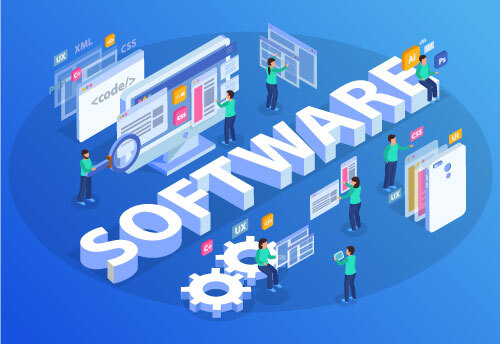Custom software development is becoming increasingly important in today’s digital landscape. With the prevalence of digital technology, organizations are now finding that the off-the-shelf solutions they once thought would work no longer meet the needs of their customers. As such, custom software development has become one of the most powerful tools which allow businesses to develop software that is tailored to their specific industry needs, as well as their customer base.
Building a custom software solution for your business can provide many benefits and advantages to your day-to-day operations. It offers improved functionality and scalability, making it easier for you to efficiently manage and grow your business. So simply, Custom software development is the process of creating software applications designed to fulfill specific customer requirements. This type of software is created to satisfy very specific customer needs that cannot be met by commercial off-the-shelf software solutions. It is a custom-made application with tailored features, functionality, data structures, and other elements that meet the needs of the customer. The software product is usually owned exclusively by the customer, and they can use, enhance, and even resell it.
Why Is Custom Software Development Significant?
Custom software provides an edge that competitors may not have. Custom development allows businesses to develop software with a focus on specific areas or features, rather than packaging a broad range of general features. This allows businesses to better cater to their customers by offering software solutions with a unique capability that can perform more efficiently and effectively. Additionally, custom software gives businesses a competitive advantage by providing features that are more in line with industry trends and providing features that help enhance the user experience. All of these combined allow businesses to get a better return on their investment and stay ahead of their competition.

Purpose of having a custom software solution
Having a custom software solution tailored to your business needs is a great way to give your business an edge over competitors. It can help you save time and money while managing operational tasks and customer relationships. While it can be an expensive undertaking, the long-term benefits will prove to be worth it. Here are some more reasons:
1. Streamlined Business Processes
By customizing and automating the business process, it can save time and resources and increase accuracy. Moreover, custom software can integrate with existing systems and bring about efficient communication between departments and functions.
2. Enhanced User Experience
By designing custom software specifically for the user experience, customers have an improved interface that unlocks innovation and maximizes user engagement.
3. Developing Competitive Edge
Custom software offers businesses the ability to be more competitive by having the advantage of unique capabilities that can set them apart from their competition.
4. Increased Security
Custom software helps businesses to secure confidential data by providing automated security measures. By locking down certain protocols on the system, data theft is minimized.
5. Cost-effectiveness
Custom software helps businesses gain cost-savings in the long run as the software need not be purchased off the shelf but instead can be tailored to the exacting requirements of the company.
6. Increased Integration
The integration of custom software with other systems and data is possible. This allows for a seamless working environment and helps you get the most out of your existing technology.
7. Flexibility
With custom software solutions, you can easily adjust the software as your business grows and changes. This ensures that your software will always be up to date and can handle any changes in the industry.
How to Build a custom software solution?
Whether you are looking to build a software solution for customer service, marketing, or HR, the process can be convoluted and complex. To make the journey simpler, here are some key steps to guide you through the process of building a custom software solution for your business:

1. Define the Project Requirements
The very first step to building a custom software solution is to define the project requirements. This includes understanding the business problem you are trying to solve and any specific features or functionalities that you may need. You should also take the time to plan out the design and architecture of the software, taking into account any potential data sources, interactions with other systems, and user roles or authentication requirements.
2. Analyze the Potential Impact
Once you’ve defined the project requirements, it’s important to take the time to analyze the potential impact of the solution. This includes understanding the impact the solution will have on the customer process, the time it will take to implement the solution, and any additional resources that may be needed.
3. Design the Features and Functionalities
Once you’ve analyzed the potential impact of the solution, it’s time to design the features and functionalities of the software. This step involves mapping out the user interface design, the workflow, data structures, and the algorithms that the software will use to process and manage data.
4. Develop the Code
Once the design is in place, it’s time to develop the code to bring it to life. Depending on the complexity of the solution, this could range from a few days or weeks to months or years. It’s important to note that coding may need to be done by a qualified software engineer, depending on the complexity of the project.
5. Test the Software
Once the code has been developed, it’s important to test the software to make sure it is working as intended. This involves running unit tests, integration tests, and user acceptance tests to ensure that the software is bug-free and user-friendly.
6. Deploy the Software
Once the software has been tested and approved, it’s time to deploy the software to the production environment. This involves setting up the necessary infrastructure such as web servers, databases, etc, and deploying the code.
7. Monitor the Software
Once the software has been deployed, it’s important to monitor the performance of the software on an ongoing basis. This includes keeping track of usage data, error logs, and other performance metrics to ensure that the software is performing as expected.
8. Maintain the Software
Finally, it’s important to maintain the software on an ongoing basis. This includes fixing any bugs that may be discovered, addressing any user feedback, and making any necessary enhancements or upgrades to the software.
Consequences of not having a custom software solution
1. Increased Cost of Operation
Without a custom software solution, businesses will incur higher costs and complexity to upgrade and maintain their existing software solutions. They may need to purchase additional licenses and support agreements to utilize the latest technologies and features.
2. Un-Optimized Solutions
A custom software solution will provide businesses with access to tailored software that is specifically designed for their particular needs and objectives. Without a custom software solution, businesses may be forced to make do with out-of-the-box solutions that are not well-suited to their needs and may not be optimized for increased efficiency, accuracy, or productivity.
3. Poor User Experiences
Without a custom software solution, users may experience more difficulty in navigating the software, increased frustration, and inadequate process support. If a user base isn’t comfortable using the software, the user experiences can quickly degrade, resulting in decreased productivity and poorer overall satisfaction with the software.
4. Diminished Security
Businesses that don’t have a custom software solution are more vulnerable to security threats and data breaches. Out-of-the-box software solutions don’t offer the same level of protection and security that a custom solution can provide.
5. Limited Integrations
Out-of-the-box software solutions are often limited in terms of their ability to integrate with other systems and platforms. Without a custom software solution, businesses will be unable to leverage advanced features, technologies, and data sources that can provide increased efficiency and productivity.

Conclusion
When it comes to building a custom software solution for your business, there are a few things to keep in mind. To create a successful solution, plan to have sufficient knowledge of the software development process, adequate resources, and the right team of experts. Once these elements are in place, you can start creating the custom software solution. This includes the step-by-step development process, which includes identifying and understanding your business needs, designing and developing the software solution, and finally, testing and launching it.
Custom software solutions are complex projects that require a lot of planning and a dedicated team of experts. To build the right solution for your business, it pays to invest the time necessary to identify and understand your unique needs. By taking the necessary steps to ensure success, you can create a custom solution that can streamline processes, improve efficiency, and ultimately drive business growth.
Looking to build a custom software solution for your business?
Get One Step Ahead Now !
Fegno Technologies is a top custom software development company in Kochi, experienced in building groundbreaking websites through innovation, using advanced technology that keeps up with the competition and attracts more customers.


 Schedule An Appointment
Schedule An Appointment